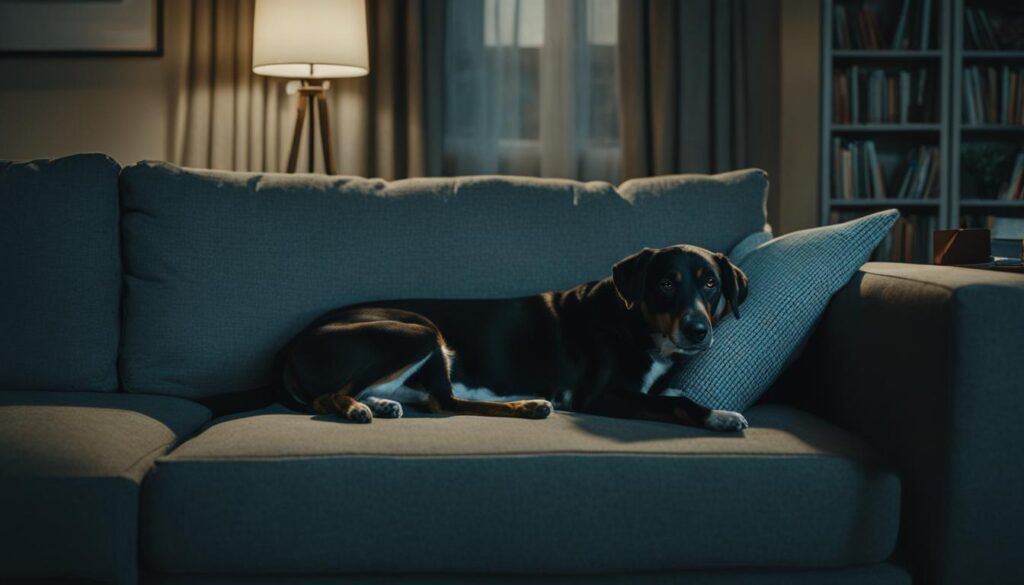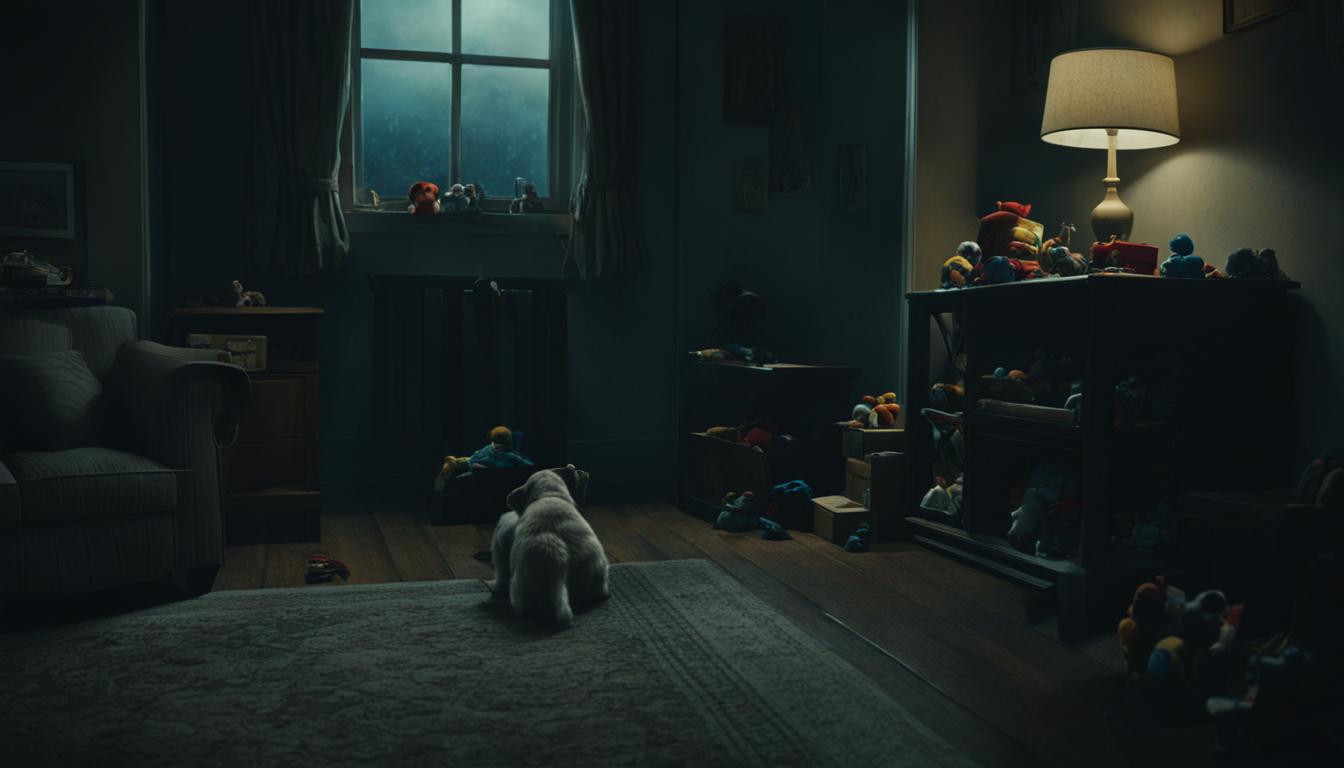Have you ever wondered why your dog chooses to sit alone in another room? Rest assured, this behavior is not necessarily a sign of rejection or a lack of desire to be with the family. Dogs have their reasons for seeking some solitary time.
Lonely dog behavior can be influenced by various factors. Dogs may opt for a different room to control their climate, find a comfortable spot to relax, avoid other family members, or de-stress by themselves. Furthermore, dogs may choose isolation when they are feeling sick or in need of personal space.
So let's dive into why does my dog sit alone in another room…….
Key Takeaways:
- Lonely dog behavior is driven by individual preferences and needs.
- Dogs may choose to be alone in another room for climate control or to find a comfortable spot.
- Personal space can help dogs relax and de-stress away from the commotion of other family members.
- Underlying physical or mental health conditions can also contribute to a dog's preference for isolation.
- Understanding and addressing a dog's needs requires attentiveness and observation.
Climate Control and Comfort
One possible reason why dogs sit alone in another room is to regulate their body temperature. Dogs may seek areas that offer relief from extremes in weather conditions, such as hot and humid environments. For example, during hot weather, dogs may choose to lay on cooler surfaces, like tiled floors, to cool down their body temperature.
Additionally, dogs may prefer certain types of flooring, such as rugs or carpets, for comfort. This can explain why they may opt to sit in a different room with a specific type of flooring that suits their comfort needs.


| Climate Control and Comfort | Description |
|---|---|
| Regulating Body Temperature | Dogs may choose to sit in a different room to find cooler surfaces during hot weather. |
| Preference for Specific Flooring | Dogs may seek comfort by sitting on rugs or carpets in a different room. |
Need for Personal Space
Dogs, like humans, sometimes need personal space to relax and de-stress. They may choose to sit alone in another room to have some quiet time away from the commotion of other family members.
This can be particularly true when there are too many people in one room, and the dog seeks a breather. Just like humans, dogs have different preferences for social interactions and alone time. Some dogs may find it easier to relax and unwind when they are alone, and they will come back for company when they are ready.
It's important to respect their need for personal space and not take it personally when they choose to be alone. Giving them the freedom to have their alone time can greatly contribute to their overall well-being and happiness.
“Dogs are like mirrors; they reflect our energy. Sometimes, they just need a moment alone to recharge.” – Cesar Millan
Understanding and acknowledging their need for personal space is an important part of building a strong and trusting bond with our furry friends. By providing them with the freedom to de-stress and enjoy their alone time, we create a positive and harmonious environment for both our dogs and ourselves.
Remember, when your dog chooses to be alone in another room, it doesn't mean they love you any less. It simply means they need a little quiet time to recharge their energy and be ready to join the family again.
Benefits of Alone Time for Dogs
There are several benefits to dogs having their alone time:
- Reduced stress: alone time allows dogs to relax and unwind, reducing their stress levels.
- Mental stimulation: being alone encourages dogs to entertain themselves and engage in activities that stimulate their minds.
- Fulfilling natural instincts: dogs have innate behaviors and instincts that they can fulfill when they have some time alone.
- Improved behavior: alone time can help dogs develop better impulse control and independence, leading to improved behavior and obedience.
Providing your dog with opportunities for alone time and respecting their need for personal space can greatly contribute to their overall well-being and happiness.
So, the next time your dog chooses to sit alone in another room, remember that it's not a reflection of their love for you, but rather their way of taking care of themselves.


Physical and Mental Health Conditions
In some cases, dogs may sit alone in another room due to underlying physical or mental health conditions. Just like humans, dogs can experience sickness and ailments that affect their behavior and preferences. It's important to be aware of these conditions and address them appropriately to ensure the well-being of our furry friends.
Anxiety and Fear
Separation anxiety in dogs is a common condition that can cause them to seek isolation. Dogs experiencing anxiety or fear may exhibit behaviors such as hiding, cowering, excessive grooming, or even incontinence. These behaviors are their way of coping with their emotions and seeking comfort in solitude.
Depression and Loss
Dogs can experience depression, especially after major life changes or the loss of a companion. Just like humans, they go through a grieving process and may prefer to be alone during this time. It's important to provide them with love, support, and patience as they navigate through their emotions.
Physical Conditions and Pain
Dogs with underlying physical conditions like heart disease, illness, pain, or age-related issues may choose to isolate themselves. Physical discomfort can make them seek solitude as a way to alleviate their symptoms or rest in peace. It is crucial to monitor their behavior and seek veterinary advice if there are any concerns about their health.


Understanding the reasons why dogs sit alone in another room involves considering a range of factors, including their physical and mental health. It's important to be attentive to their behavior and provide the necessary support and care. By addressing their health needs and ensuring their overall well-being, we can create a loving and comfortable environment for our furry companions.
Conclusion
Understanding dog behavior is essential in comprehending why dogs sit alone in another room. By delving into various factors such as climate control, comfort, personal preferences, and physical or mental health conditions, we gain insight into their behavior patterns.
It is crucial to remember that this behavior does not indicate a rejection of the family, but rather a natural inclination to meet their individual needs. By attentively observing their actions and behaviors, we can better understand and fulfill their requirements, ensuring their overall well-being and happiness.
If you have concerns about your dog's behavior or health, seeking professional advice from a veterinarian or animal behaviorist is highly recommended. With a comprehensive understanding of dog psychology, communication, body language, and socialization, these experts can provide invaluable guidance and support.
FAQ – Why Does My Dog Sit Alone in Another Room?
Why does my dog sit alone in another room?
Dogs may choose to sit alone in another room for various reasons. It can be due to climate control, seeking a comfortable spot to relax, avoiding other family members, or de-stressing by themselves. Additionally, dogs may sit alone in another room if they are feeling sick or need some space.
Is it a sign that my dog doesn't want to be with the family?
No, this behavior is not necessarily a sign of rejection or a lack of desire to be with the family. Dogs have their own preferences for social interactions and alone time, just like humans. They may choose to be alone for a while and come back for company when they are ready.
Can climate control be a reason for dogs sitting alone?
Yes, dogs may seek areas that offer relief from extreme weather conditions. For example, during hot weather, they may choose to lay on cooler surfaces like tiled floors to cool down their body temperature. Similarly, they may prefer certain types of flooring, like rugs or carpets, for comfort.
Why do dogs need personal space?
Like humans, dogs sometimes need personal space to relax and de-stress. They may choose to sit alone in another room to have some quiet time away from the commotion of other family members. It's a natural behavior that allows them to unwind and recharge.
Could there be underlying health concerns causing my dog to sit alone?
Yes, dogs may sit alone in another room due to physical or mental health conditions. Anxiety, fear, depression, or underlying physical issues can contribute to a dog's preference for isolation. If you observe concerning behaviors or suspect health problems, it's best to consult with a veterinarian or animal behaviorist.
How can I better understand my dog's behavior?
Understanding your dog's behavior requires being attentive and observant. Pay attention to their body language, socialization needs, and preferences for alone time. By being responsive to their needs, you can ensure their overall well-being and happiness.





